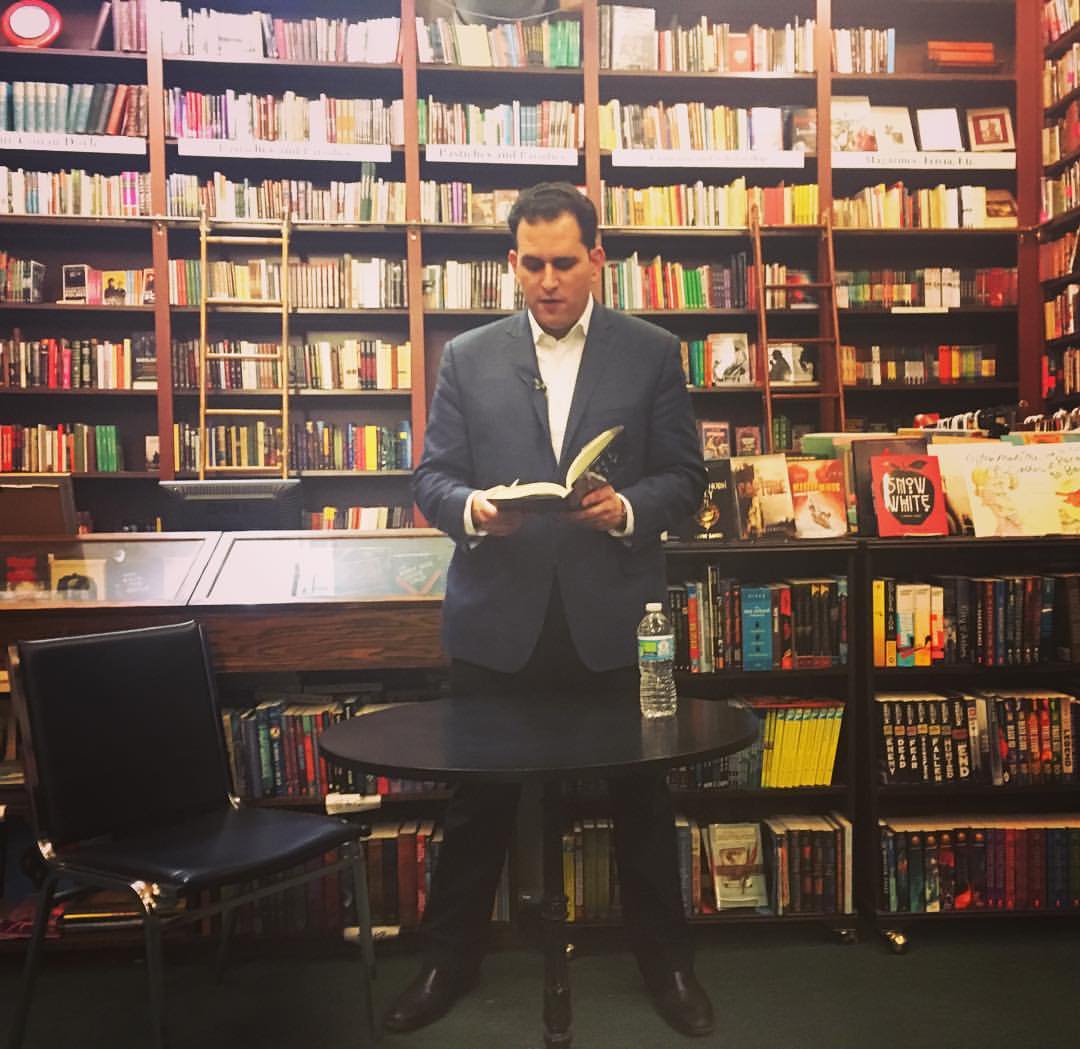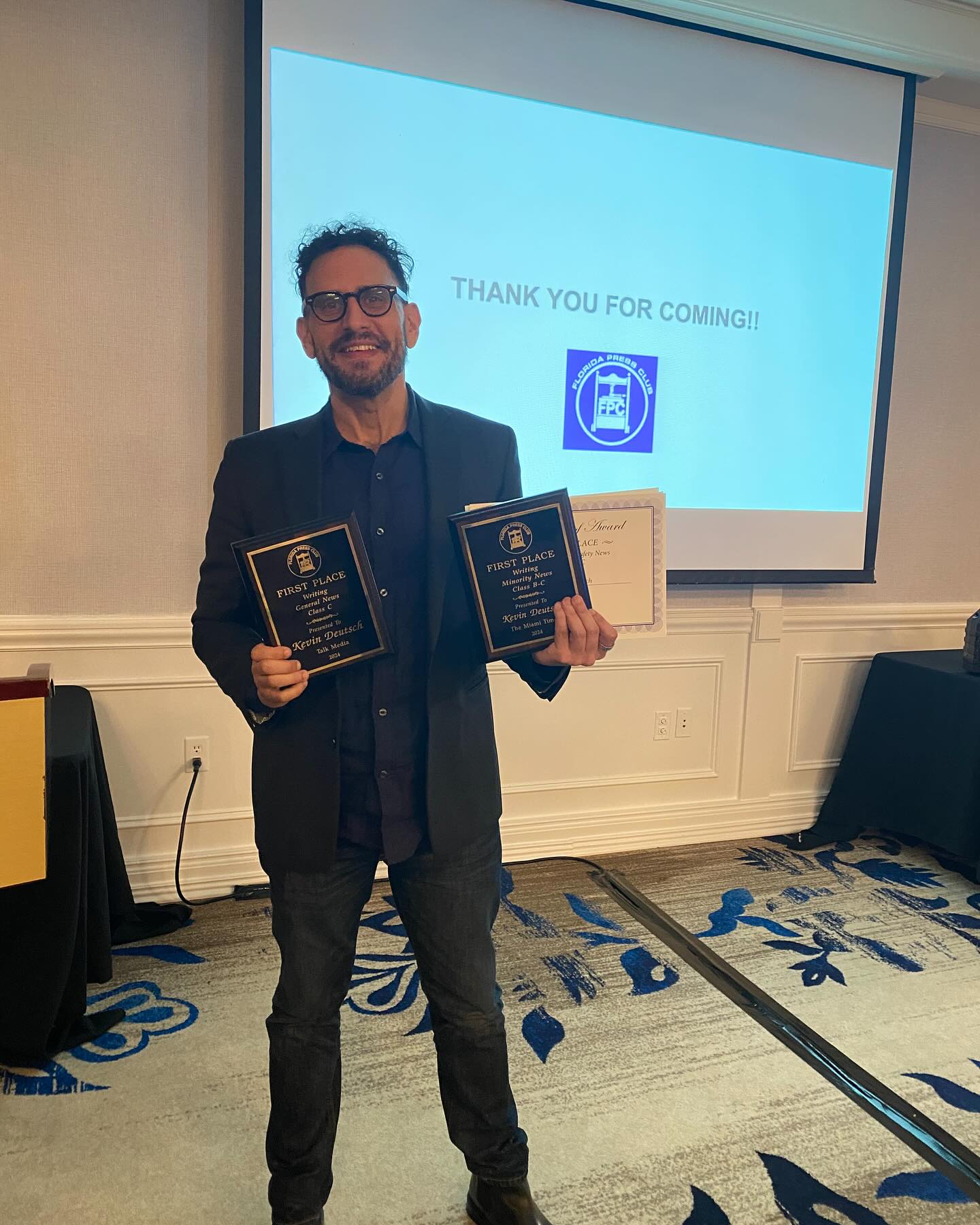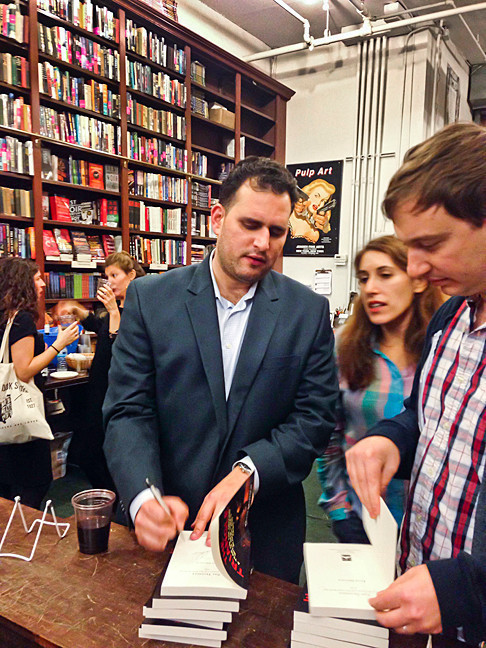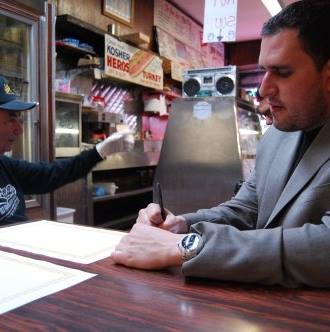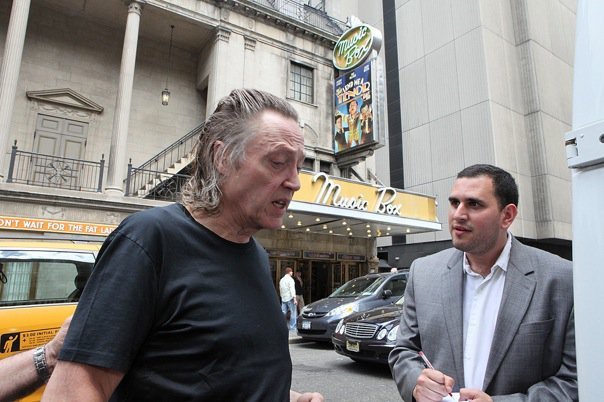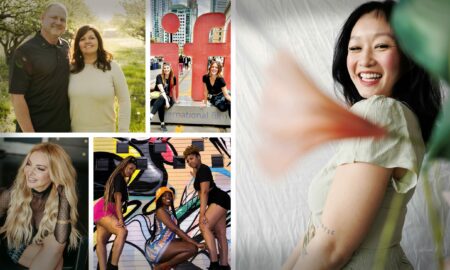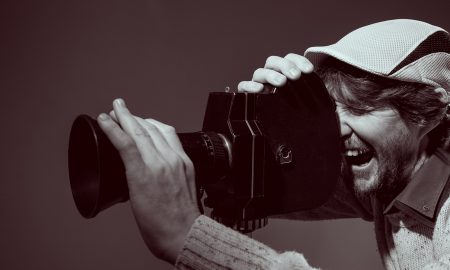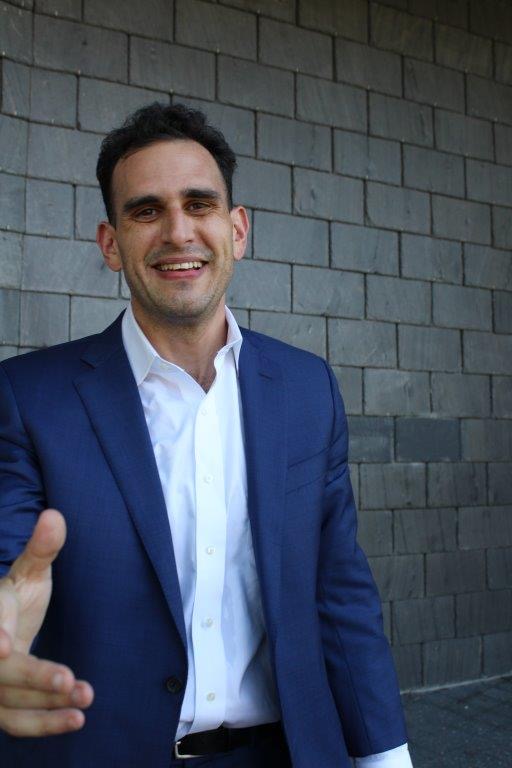

Today we’d like to introduce you to Kevin Deutsch.
Kevin, we appreciate you taking the time to share your story with us today. Where does your story begin?
From the start, my life and career have been shaped by two things: My Jewish identity and my writing. I was born into a middle-class Jewish family in Brooklyn, New York in 1981 — seemingly a world away from Kansas City. My mother worked as a freelance illustrator, drawing designs for clothing and textile companies, while my father ran a small clothing store across from the street from the Chelsea Hotel. New York City was the heart of America’s garment industry then and my parents were a part of that world — a world in which many Jewish immigrants and their children earned their livelihoods.
My parents met at a Jewish singles mixer in Manhattan, fell in love, and had me in their late 20s. They had a tumultuous marriage and divorced when I was three; I never saw my father again. My mom — with the last of her money — flew the two of us to Los Angles to live with my great-uncle, Milton Greene. Uncle Milt was a gifted musician who’d worked as the musical director on a number of Broadway shows, including a massively successful Broadway run of “Fiddler on the Roof.” He and my mother were part of a creative lineage in our family dating back generations — some of our ancestors had fled antisemitic persecution in Europe and the Pale of Settlement and reached America, but most perished in the Holocaust or under Stalin’s totalitarian regime. The creative impulse that runs in our family undoubtedly helped me become a writer.
My mom saved up a bit of money and moved us to Miami Beach, where we had a cousin, Cousin Syd. A 70-something, battle-axe of a woman, Syd invited us to live with her temporarily while my mom plotted our next move. We shared a small bedroom in Syd’s apartment on what is now prime real estate near Miami Beach’s Collins Avenue. In those years, the area was plagued by street crime, prostitution, and the Colombian cocaine wars. It was a chaotic time, but I became so enamored with the Miami Dolphins and their new star quarterback, Dan Marino, I barely noticed how stressed my mom was trying to eke out a living. She worked tirelessly to keep us fed and clothed, and always had a positive attitude. She believed better times lay ahead and convinced me of the same.
When Syd grew tired of sharing her apartment, we moved to a tiny apartment in a run-down part of Miami; a one-bedroom infested with cockroaches and Palmetto bugs, which I’d sometimes awaken in the night to find crawling on my skin. I’d jump out of bed and howl in terror. The same thing happened in our next home, a dilapidated cottage we rented in South Miami. After a while I got used to the bugs and they no longer bothered me. At night we sometimes heard gunshots, yelling, sirens. It seemed the police were always in our neighborhood. Outside, I’d find shell casings in the streets and pocket them, building a collection I’d show off to my friends at school. They thought I was crazy. Most of them lived in big houses and had nice clothes and new sneakers; my mom dressed me in thrift-shop finds and hand-me-down shoes her better-off friends gave her. She began teaching art to night school students in adult education classes in Miami, putting her earnings toward our rent and food. There wasn’t enough for much more.
I was an introspective, imaginative kid and read everything I could get my hands on. My love of Batman comics knew no bounds, and when later on my mom purchased a used Smith and Corona electric typewriter, I began writing stories starring the Dark Knight and the Joker.
Since I didn’t know my dad, I learned lots of life lessons from guys my mom dated over the years. They taught me to fish and swim; taught me about girls and cars. We may have been broke, but my mom always loved me fiercely and protected me. She also encouraged me to write in a journal she’d bought for me at a used bookstore. I still own that tattered notebook and have been journaling ever since.
I experienced antisemitic bullying in school, and had to learn to fight to protect myself. I sought escape in young adult novels and the stories I created — both in my mind and on paper. I loved Dick Tracy and gravitated to stories about hardboiled, world-weary heroes. I’d pluck discarded copies of the Miami Herald out of trash bins and read the news and sports sections cover-to-cover. That was my first exposure to journalism, and by the time I reached high school, I knew I wanted to be a writer.
I spent so much time daydreaming, I barely got by in school. My senior year, I told my mother I wanted to join the Navy—I loved the ocean and longed to have adventures like the heroes I’d read about. She convinced me to try college instead. I barely got in but, once there, found I enjoyed the classes and social life. I’d never seen so many pretty girls or had so much access to cheap beer. I majored in English and partied too much. I also improved my writing and began freelancing for two local newspapers. I’d never reported the news before, and found it both exhilarating and terrifying. It was the only way I could see of making a living without sitting unhappily in an office cubicle, so I applied for reporting internships and landed one at the Miami Herald. It was unpaid, but I didn’t mind. The editors were tough and passionate; they taught me newswriting and whipped me into shape as a reporter. They put me on the police beat and l exceled. Murders, fires, gang shootouts, car wrecks, hurricanes. I covered them all. It was trial by fire, and soon my writing was sharp, colorful, and clear.
After college, I went on to work as a reporter on staff at the Miami Herald, the Palm Beach Post, and several newspapers in New York. One memorable job was as a staff writer at The Riverdale Press, a Pulitzer Prize winning weekly paper in the Bronx. It paid peanuts but I had a blast covering all kinds of stories. The Bronx is still the least understood and most interesting borough in the city. I loved chronicling life in its communities.
It was my dream to work at the Daily News in New York, and when I landed a job there covering the Bronx Courts beat, I was overjoyed. I also worked the rewrite desk and covered general assignment while at the paper. I interviewed lots of notables including Donald Trump, back when “The Apprentice” was the top-rated show in America.
I wrote two true crime books in the 2010s and, after that, felt burned out by all the violence and tragedy I’d covered. I had some very difficult years both professionally and personally, but I never stopped writing. In 2020, Netflix made a development deal with a writer/director, the brilliant Gerard McMurray, to turn one of my books into a limited series. I got to hang out with some amazing writers, filmmakers, and producers while the project was in development. In the end, Netflix decided not to take out the option on my book, but I stayed in the Hollywood orbit for a while working as a freelance pitch document writer for a studio called Gunpowder & Sky, plus a few producers.
After a while I got to missing journalism. I longed to see the country and cover a world different from my own. I did both by landing a lob at the Rio Grande SUN, a scrappy weekly in the city of Española in Northern New Mexico. I wrote about drug addiction and trafficking; political corruption and education; the tension between the indigenous Pueblo tribes and the ancestors of Spanish Conquistadors who’d settled in Española. I was the only Jewish person for miles, and antisemitism was prevalent; my landlord disliked Jews because she hated Israel; one of my colleagues distrusted Jews because he held us responsible for Jesus’ death. I wrote some of my best stories at the SUN, but knew I couldn’t stay.
My next stop was Miami and two news jobs, one of them as a staff writer at The Miami Times; a Black weekly newspaper with a rich history and reputation for fearless watchdog reporting. I learned all about the Black Press and its stated mission of lifting up not just Black Americans but all people—a mission that drove me to do some of my best work. I won a few statewide journalism awards but, more importantly, some of my stories made a difference in people’s lives.
Before landing at The Miami Times I’d been working for Talk Media, a digital, hyperlocal news chain in South Florida. I went back to that company after the October 7, 2023 terrorist attacks on Israel. I felt called to help my people amid the explosion in global antisemitism that followed Oct. 7 and the ongoing Israel-Hamas war. My editor allowed me to write about Jewish issues and communities — things I cared about deeply. I’m still covering those stories and issues for Talk Media today, working remotely from here in Kansas City.
I moved to downtown KC in August 2024 to work on a book about Jewish gangsters and the Garment District in the city’s old Prohibition days, and because I love this city. I cover Jewish community issues for the Kansas City Jewish Chronicle, Kansas City’s Metro Voice, and the St. Louis Jewish Light. I first visited KC in 2012 while reporting a story and fell in love with the city’s energy. I think it’s one of the world’s greatest cities — the food, history, music, culture, and people all inspire me daily. There are so many untold stories here. As a journalist, I love digging them up and sharing them with readers. Being part of the city’s story is a gift I’m thankful for every day.
I plan to live and write here until they kick me out for eating too many BBQ ribs.
I’m sure it wasn’t obstacle-free, but would you say the journey has been fairly smooth so far?
There’s been hardly any smooth road on my journey, and that’s what’s helped make it so fulfilling! I think adversity is the fuel that makes us grow. It forces us to change ourselves and our stories; to find new paths when old ones are washed away. When difficult things happen, we can either adapt and struggle bravely toward a new way of being, or remain stagnant and defeated by fear. I think only the former approach can give our lives meaning, and move us toward greater fulfillment.
On my journey, there have been many struggles: struggles with depression and OCD; struggles to pay the bills with my writing; struggles against antisemitism and other forms of racism. Professionally, I’ve had to build up a thick skin. Being a writer makes you a public person, and that means you’re sometimes going to be attacked, maligned, and targeted by people who dislike you or something you’ve written. I have to be very mindful of making sure my loved ones are protected and kept safe. I try to love as hard as I can and live as passionately as I can; our time here is outrageously short.
At 44, I’m old enough to know times of adversity are going to challenge me on a regular basis. I try to learn something from every difficult stretch, believing G-d has placed that rough road before me in order to help me grow; to help me become a better, more fully realized person. Journalism is my way of connecting with the world around me and trying to make the world a better place for all people.
Thanks – so what else should our readers know about your work and what you’re currently focused on?
I’m a writer and journalist specializing in coverage of Jewish communities and issues in Greater Kansas City and Missouri.
I’m known for finding Jewish stories off-the-beaten-path. For example, I recently wrote about a really cool Jewish-owned business downtown and, in the process, got to tell the story of Kansas City’s old Garment District.
I’m most proud of the journalism I’ve done exposing racial discrimination; stories that have led to reforms that better protect Jews and other minority groups.
I think what sets me apart from others is my willingness to stick my neck out in my work to do what I feel is right, even if it’s painful or risky. Sometimes, that means writing controversial stories. I often choose the more difficult of two paths. The harder path is the one on which you grow and ultimately do the most good for yourself and others, I think.
Are there any books, apps, podcasts or blogs that help you do your best?
One book I always come back to in times of personal or professional crisis — when I need to find a way to deal with adversity — is “Man’s Search for Meaning” by Dr. Viktor Frankl. The book is Frankl’s memoir of survival in Nazi death camps during the Holocaust, as well as an introduction to his psychotherapeutic method, known as logotherapy.
The most famous line in the book is one I keep taped to my writing desk: “Everything can be taken from a man but one thing: the last of the human freedoms—to choose one’s attitude in any given set of circumstances, to choose one’s own way.”
Frankl taught me and millions of others that we alone posses the power to choose our response to events, no matter how terrible they may be. Adversity can demoralize and destroy us, or it can show us a new path forward—by bringing into stark relief the things that give our lives meaning. Frankl posited that man could survive most any “what” if he had a “why” to live for. Frankl’s “why” — the things in which he found meaning enough to survive the death camps — were the hope of seeing his wife again and finishing his book.
We all must find our own “why” sooner or later if we are to endure and thrive.
Another tool I’ve relied on to inspire and guide me are the books and lectures of Joseph Campbell. The core of his teachings is the concept of the “Hero’s Journey,” which we find in myths and stories throughout history; in everything from Homer’s “The Odyssey” to George Lucas’ “Star Wars.”
Campbell sought to help us recognize the hero myth in our own lives; the compelling story we tell ourselves to face life’s challenges, transform our pain into meaning, and come out on the other side as better, more complete humans who help others.
My favorite hero’s journey story is “Rocky,” which I still watch whenever it’s on TV. I’ve adopted Rocky’s journey as my own hero myth. We all have a hero’s journey we must undertake sooner or later, often multiple times.
Contact Info:
- Website: https://kevindeutsch.us
- Instagram: @kevindeutschjournalist
- LinkedIn: @kevindeutschjourno
- Twitter: @pillcitybook
- Youtube: @kevindeutschjournalist
- Order Kevin’s books here: https://www.amazon.com/stores/Kevin-Deutsch/author/B00MBRB2DE
